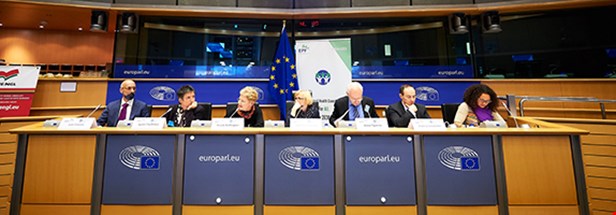EPF Access Campaign - Concrete Ideas to Achieve Universal Health Coverage
 ©EPF
©EPF
On 27 February, the kick-off meeting of the EPF campaign on Access to Healthcare gathered more than 75 participants representing a wide range of health stakeholders. The opportunity to deliver some key proposals on how to achieve Universal Health Coverage for all by 2030!
Co-hosted by MEPs Kateřina Konečná (GUE/NGL, Czech Republic) and Andrey Kovatchev (EPP, Bulgaria), the meeting offered a stage to officially present the campaign, its goals, and concrete objectives.
MEP Kateřina Konečná opened the intro session calling on stakeholders at all levels of power to adopt a new mindset that should be the cornerstone of any future policy or action on access. “Universal health coverage should be a basic human right”, she said, “and should not be conditioned by economic and social criteria.”
Speaking on behalf of the European Observatory on Health Systems and Policies, Josep Figueras demonstrated how the dynamics of health systems are quite complex and can sometimes even seem antagonistic. On the one hand, most of the EU health systems have been resilient to the economic crisis; which should be acknowledged and used as good examples to other countries in the world. However, real barriers to access and inequalities across countries within the EU persist. Arguing that “health is a political choice” Mr Figueras urged Member States to invest sustainably in health to reduce waste and guarantee affordable care and treatments for all. “Without efficiency you cannot have equity,” he said.
Investing in health is one thing, but doing so sustainably is another. In her contribution, Agnès Couffinhal from the OECD drew the audience’s attention on the need to urgently tackle the burden of wasteful spending in health. Latest OECD data predicts that health spending will continue to rise, but not to the level needed to achieve Universal Health Coverage. “Up to a fifth of health spending in OECD countries is wasteful spending that either is allocated to services and processes which are either harmful or do not deliver benefits, or that generates costs which could be avoided by substituting cheaper alternatives with identical or better benefits,” Mrs Couffinhal said. She underlined the importance of identifying waste and involving all the relevant parties in tackling it.
Figures can be telling, but nothing is more powerful than real patients’ experiences. Juan Fuertes, representing Pulmonary Hypertension Association (PHA) Europe as EPF Board member shared experiences of patients struggling to cover unmet needs because of budget cuts and/or discrimination: “Member States have responded to the crisis by bungling health budgets, adding an additional layer of difficulty to patients and households.” Mr Fuertes lamented the lack of solidarity that places a large part of the burden on patients’ shoulders. The latest EPF survey on Access certainly backs his claim, with data showing an alarming 60% of respondents acknowledging financial hardship due to their condition. Juan called for real political commitment from Member States to involve patients at every level and reach a successful, holistic approach that guarantees the access to affordable and comprehensive health and social care services.
Universal Health Coverage can only be universal if no group is left behind. Sadly, this is still not the case today, reminded us Alyna Smith from the Platform for International Cooperation on Undocumented Migrants (PICUM). Echoing the early statement of MEP Konečná, she stressed that “Failure to acknowledge the rights and needs of vulnerable populations undermines our efforts to achieve Universal Health Coverage”. In this regard, she detailed the difficulty to gather data and evidence on marginalised people, and called for better policies to address discrimination and improve humanitarian support.
The panel debate gave the opportunity to guest speakers and participants to share their ideas on how to achieve Universal Health Coverage. Isabel de la Mata, representing European Commission’s DG SANTE, reminded the audience of the established commitment from the Commission to collaborate with other EU institutions and Member States. To our regret, no mention was made of specific actions by the Commission on achieving universal access to care, despite the great need for a coordinated approach at European level.
In his closing address, MEP Andrey Kovatchev made the case for investment in prevention, insisting on the need of reducing inequalities. “Money should be used to grant access to the right care in the correct setting, and innovation should go to all Member States at the same time, to reduce inequalities”.
EPF will now work with its members and other campaign’s supporters on the production of a policy document that will include concrete recommendations to achieve Universal Health Coverage, supporting Member States in delivering on their commitment to meet this goal.
You can have a look at the pictures of the event here!
#Access2030
